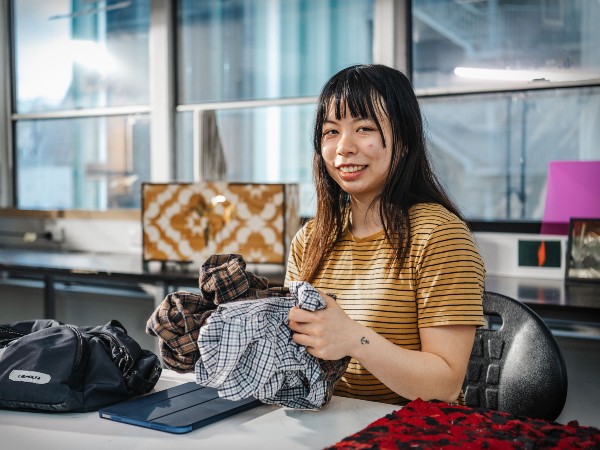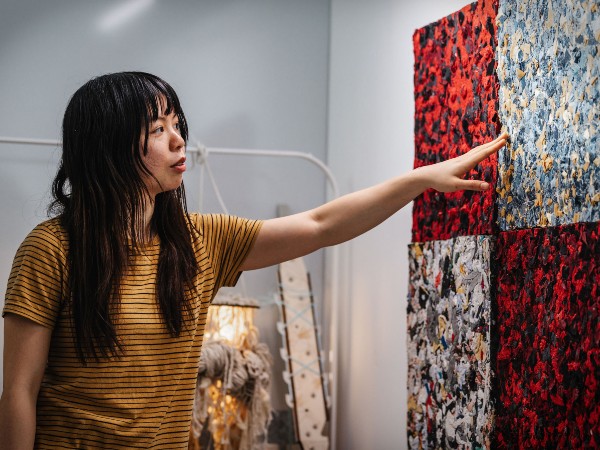Sze Yek, an RMIT student and this year’s James Dyson Award national winner, is tackling one of Australia’s growing environmental issues—textile waste—with an innovative solution called Sorbet.
Australia is facing a textile waste crisis, with six tonnes of textiles and clothes discarded every ten minutes, most of which end up in landfills. This waste not only contributes to environmental degradation but also represents a missed opportunity to repurpose valuable materials. More info on this can be found in the press release.
Sorbet Acoustic Panels by Yek offer a groundbreaking approach to this issue by transforming upcycled household textile waste into aesthetically pleasing, functional acoustic panels. Unlike traditional panels, which are often difficult to recycle, Sorbet panels provide a sustainable alternative that not only serves practical purpose but also raises awareness about our consumption habits.
As a student of both fine arts and industrial design (honours) at RMIT, Yek has a unique approach to problem-solving, combining artistic creativity with practical design to create something both beautiful and sustainable.

The James Dyson Award is an international design award that celebrates, encourages and inspires the next generation of design engineers.
The competition is open annually to designers who think differently, to create products that work better.
Winning the James Dyson national award has provided her with AU$9700 to further develop her project, and she now represents Australia on the global stage to compete to progress to the Top 20 global shortlist. Here, she will compete for the top prize of $58,000, which will be awarded by Sir James Dyson himself in November.
The James Dyson Award is an international design award that celebrates, encourages and inspires the next generation of design engineers.
The competition is open annually to designers who think differently, to create products that work better.
Architecture & Design Australia’s digital editor Clémence Carayol sat down with Yek to discuss the genesis of her project and her achievements as this year’s James Dyson Award Australian winner.
Architecture & Design Australia: Can you share a bit of background on your studies so far?
Sze Yek: I began my education at RMIT with a Bachelor of Fine Arts. I’ve always been motivated to explore and experiment with materiality and the aesthetic potential that they have. In 2023, I graduated from RMIT’s Industrial Design (Honours) course where I developed an appreciation for sustainability and how it can be aestheticised.
As part of my Industrial Design honour’s project, I developed Sorbet acoustic panels as a more efficient and sustainable alternative to other acoustic solutions. I am currently investigating aesthetics through key theorists such as Dr. Paul Hekkert’s aesthetic principles and Woodruff’s virtue theory on aesthetics to explore gift-giving for my loved ones in RMIT’s Fine Arts (Honours) course in 2024.
I am in the process of applying for my master’s in design with RMIT for 2025.
You are James Dyson Award national winner of the year – how do you feel about this recognition?
As a national winner of the James Dyson Award, I feel honoured and optimistic with the opportunity for Sorbet to have an impact beyond a university project. I feel grateful for my supervisor, colleagues, peers, and family members who have also contributed immensely to the success of Sorbet.

What is Sorbet, and what’s the inspiration of the project?
Sorbet is an acoustic panel made from reliably sourced and laundered textile waste, shredded and combined with a water-soluble starch-based glue before it is dehydrated into a durable acoustic material. Sorbet acoustic panels are more efficient and sustainable than foam-based and contemporary acoustic solutions. Its acoustic performance was tested in a sound-controlled room, where it outperformed foam-based panels by 23.9% and EchoPanel by 10.5%.
I began my inquiry on sourcing bulk paper, organic, and textile waste for my sustainability project with RMIT in 2023. My research found that bulk paper and organic wastes are currently managed by highly efficient programs and infrastructures which led me to sourcing bulk waste textiles that are available through households. In 2024, Australia ranked as the highest country per capita in fast fashion consumption.
According to the Australian Bureau of Statistics (ABS), between 2018-2019, 90% of textile waste— roughly 247,000 tonnes— that ends up in Australian landfill come from households. Through this statistic, I found an opportunity to address a significant sustainability issue, by aestheticising and upcycling bulk textile waste into acoustic panels, a commodity that protects the physical and mental health of users from noise pollution in both domestic and commercial spaces.
Why is sustainability crucial and at the forefront of your work?
There is a constant need for sustainability and sustainable practices to inform responsible consumption. I enjoy implementing sustainability into what I make as it challenges me creatively and broadens my understanding and ability to work with a range of materials.
By prioritising sustainability, it allowed me to discover and implement new aesthetic languages such as with textile waste on the Sorbet acoustic panels. I find the opportunity to develop my knowledge on aesthetics through sustainable constraints the most gratifying part of the design process.
What’s next – any exciting projects you are already working on?
I am currently working on my end of year aesthetic focused Fine Arts Honour’s project: Mother in Braille with RMIT. In Mother in Braille, I seek to manifest unique ways of demonstrating love and reciprocity to my mother through gift giving.
Where do you see yourself in a few years, once you are finished with your studies?
I hope to further contribute to the arts and culture landscape of Australia as an artist, perhaps visit my father’s hometown in Sarawak, Malaysia with some exciting sustainability-focused projects. I’d love to contribute towards sustainable practices, improving the transparency of products and processes to inform responsible consumption, with the plus of making it an exciting, desirable, and attractive thing to do.

